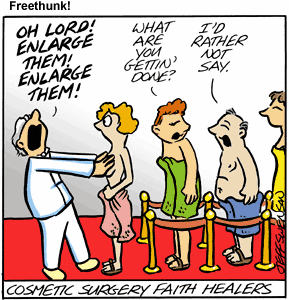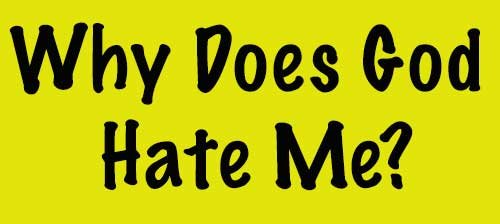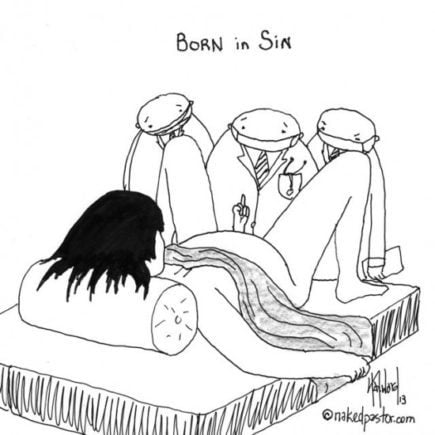
Repost from 2015. Edited, updated, and corrected.
The Bible commands Christians to live by faith. According to Hebrews 11:6, without faith it is IMPOSSIBLE to please God.
Christians are saved by faith, through grace. Ephesians 2:8, 9 says: For by grace are ye saved through faith; and that not of yourselves: it is the gift of God: Not of works, lest any man should boast.
According to the Bible, no one deserves salvation. God, a gracious, kind, loving and just deity, purposes to save some sinners out the mass of sinners called the human race. God doesn’t have to save anyone, but he chooses to save some. We all deserve judgment and hell, so no one can charge God with favoritism because he chooses to save some but not others.
Those who are saved by the wondrous grace of God become new creations in Christ Jesus. 2 Corinthians 5:17 says: Therefore if any man be in Christ, he is a new creature: old things are passed away; behold, all things are become new.
Since Christians are new creations in Christ, they are commanded to live lives of faith. The Holy Spirit indwells — literally lives inside of — every Christian, teaching them everything that pertains to life and godliness. Christians don’t have to go to church to find God, God is with them 24/7. God has promised to never, ever leave the followers of Jesus.
According to the Bible, the essence of the Christian life is FAITH. Romans 1:17 says: For therein is the righteousness of God revealed from faith to faith: as it is written, The just shall live by faith. Romans 5:1,2 says: Therefore being justified by faith, we have peace with God through our Lord Jesus Christ: By whom also we have access by faith into this grace wherein we stand, and rejoice in hope of the glory of God. The Apostle Paul told the Corinthian church that Christians walk by faith, not by sight.
From beginning to end, the Christian life is one of faith. There is no work Christians can do to gain favor with God. God gives Christians the gift of faith and commands them to live a life totally dependent on him. To live a life according to the flesh or according to the philosophies of this world is, according to the Bible, to deny that Jesus is your Lord and Savior.
Let me repeat: the Bible makes it clear that without faith it is impossible to please God. IMPOSSIBLE!
How does this life of faith work out in the day-to-day lives of Christians?
Christians are taught to tune into God’s radio channel. Through prayer and reading the Bible, along with regular attendance at public worship, Christians can divine the will of God. God has a perfect will for everyone. Since God is omniscient, omnipresent, and omnipotent, he knows exactly how Christians should live their lives. Christians are called on to live lives of self-denial — lives where the only thing that matters is God’s will. Christians, indwelt by the Holy Spirit, through prayer and reading the Bible, can determine exactly what God wants them to do.
It would seem that, if the premise above is correct, all Christians would believe the same thing and live their lives in similar fashion. But, as anyone familiar with Christianity knows, the Christian church is hopelessly fractured. Sectarian splits and internecine wars are quite common as denominations and churches slug it out to see who has THE truth. It seems that God has a hard time making up his mind about what the “faith once delivered to the saints” is. It seems God is uncertain about how Christians should live the life of faith. One Christian says ________ is a sin and another Christian says no it is not. Both appeal to the Bible as the authority for their belief and practice.
I have sat through countless church business meetings filled with people who had prayed about the matters that were going to be discussed. One would think that everyone in the business meeting would come to the same conclusion, but I never experienced a meeting where everyone was in agreement. I’ve seen plenty of business meetings where everyone seemed to be in agreement, but two or three weeks later, after the church gossip line had run its course, I found out that there were people not in favor of what we voted to do. It seems that the Holy Spirit changes his mind quite often.
I spent most of my adult life intimately involved with the Christian church. As I’ve said many times before, I know what really goes on behind closed doors, and I know where the bodies are buried. While Christianity likes to paint itself as a unified body of people who are in love with Jesus and follow him wherever he leads, the truth is there is little or no unity, and quite often, if Jesus is headed one way, they are headed in the opposite direction.
Christians who are serious about their faith work very hard at trying to know what God wants them to do with their lives. They listen intently to their pastor’s preaching, hoping to hear and feel that little nudge from God. They diligently read their Bibles, hoping that one of the verses will jump out at them and, with blaring sirens, alert them to what it is God wants them to do. Christians will spend significant amounts of time in prayer. Prayer is where the Christian talks with God and hopefully God responds.
I’ve heard countless Christians say, and I have said it many times myself, God has laid ____________ on my heart. How do Christians know that God has laid something on their heart? They just know it. It’s that spidey sense, that feeling that one gets when all is well and everything is at peace. It is not uncommon to hear a Christian say “I have peace about this matter.” Of course, there is no way to know that it’s God. How could a Christian ever PROVE that God is laying something on his heart?
Many Christians realize the danger of living a life solely dictated by faith. They read their Bible, pray, seek the counsel of other people, yet they still have nagging doubts about what God is asking them to do. Sometimes, a Christian cannot bring himself to do what he believes God wants him to do, and at that moment he becomes a person who is commonly known in the church as being “out of the will of God.”
There are two labels that no Christian wants attached to their lives: out of the will of God and backslidden. Preachers spend a significant amount of time preaching to such people. These sub-par Christians are blamed for a lot of things. The church would have revival or the blessing of God or have their financial or spiritual needs met if only backslidden Christians would get right with God. It is a tremendous weight to feel that you are not right with God and that you are the blame for all the bad things that are happening.
I spent the first fifty years of my life in the Christian church. I was a devoted follower of Jesus Christ. I was intent on following the Lamb of God (Jesus Christ) wherever he went. I attempted to live my life according to the premise “what would Jesus do?” Every day I purposed to deny myself, take up my cross, and follow Jesus. And every day, I failed to meet this impossible standard — but I kept trying, trying, and trying.
I was taught, and I taught others, that every Christian has a cross to bear. Every Christian has a weight in his life that weighs him down, a burden he alone must carry. In my life, I thought my weight was living in poverty. As an act of self-denial, I believed God wanted me to live the pauper’s life, and he wanted my wife and kids (collateral damage) to do the same. Of course, pastoring poor churches made it a lot easier to live this way.
As I look back on this time in our life, I realize how foolish it all was. Good intentions perhaps, but nonetheless very foolish. I was so focused on the work of the ministry and getting sinners saved that nothing else mattered. Retirement? I had no plans to retire. I planned to die with my boots on. Savings? Why save money when you can give it away to the church and those in need. Disability insurance? Who needs that? God will protect me and give me the strength that I need.
My family and I did without so that the work of God could prosper and God would be pleased. Church members found great pleasure in telling other people about how their pastor and his family lived a simple life unencumbered by material things. Of course, the same church members who praised us rarely had any desire to live the same life we were living. While they saved, planned for retirement, bought their homes, and had insurance, my family and I lived in poverty.
I’m sure by this point someone is going to suggest that I should have done things differently. (Ya think?) Family and financial security come first. I certainly believe that now, but at the time I believed I was doing the will of God living the way I did. I knew God had called me to preach and pastor churches, so the fact that I only pastored one church that paid me a living wage was immaterial. Here I am Lord, use me, was all that mattered.
I now realize that I made a lot of mistakes. My college professors and mentors taught me that my wife and family were secondary to the ministry. If I had to make a choice between family and the church, God wanted me to choose the church. I wrote about this in the post It’s Time to Tell the Truth: I Had An Affair. I now know my family comes first. I now know that my first priority must be to provide for the material well-being of my wife and family. I wish I had come to this revelation while I still had strength of body, but now it is too late. I realize there are no do-overs, so I must move forward with what I have. Fortunately, my wife has a good job, and through careful planning and budgeting we can live a decent life.
Thirteen years ago, we bought our first home. In the past, we owned a couple of mobile homes that sat on rented property. Now we own not only the house, but the ground underneath it. It still thrills us to know that we own our own place and can do whatever we want. In recent years, we have purchased several new cars. Our last new car purchase before now came in 1984, a Plymouth Horizon that I put 100,000 miles on in two years. Between 1984 and 2010, Polly and I drove everything from cars bought at Buy-Here-Pay-Here lots to $300 clunkers. There are some cars that we have owned which, if I brought them home today, Polly would likely do a reenactment of the Burning Bed.
I’ve come to the conclusion that faith was an excuse for irresponsibility; that waiting for God to provide was an excuse for doing without. If I had to do it all over again, I would have been a bi-vocational pastor. I would’ve worked a secular job. I would’ve made sure that my family was provided for, that we had insurance, that we had money saved, and that we had adequately planned for the future. As with all things in the past, it is what it is. All anyone can do is learn from their mistakes and hope that the same mistakes are not repeated.
Bruce Gerencser, 68, lives in rural Northwest Ohio with his wife of 47 years. He and his wife have six grown children and sixteen grandchildren. Bruce pastored Evangelical churches for twenty-five years in Ohio, Texas, and Michigan. Bruce left the ministry in 2005, and in 2008 he left Christianity. Bruce is now a humanist and an atheist.
Your comments are welcome and appreciated. All first-time comments are moderated. Please read the commenting rules before commenting.
You can email Bruce via the Contact Form.










